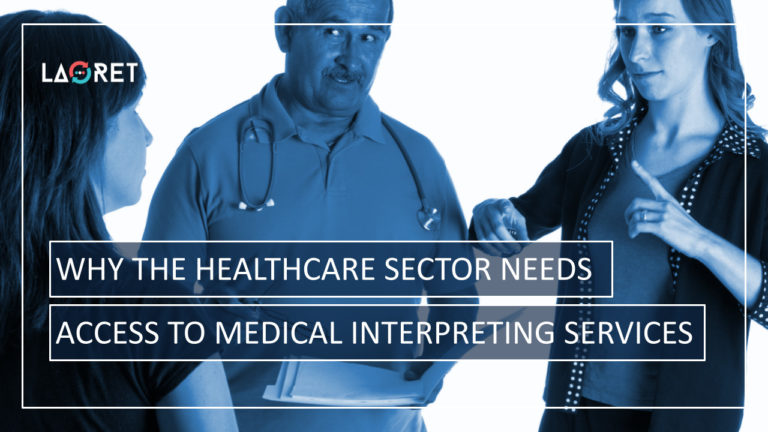Why The Healthcare Sector Needs Access To Medical Interpreting Services
These days, Medical Facilities are not complete if they can’t provide effective healthcare services for patients from all backgrounds. And the pandemic has added a different level of urgency to this. While it is keeping us apart in most ways, the need to connect through language and culture has increased more than ever.
That is why medical interpreting services should be integrated in any institution so that patient comfort can be guaranteed, and legal obligations are met. Here is how!
The Pandemic And The Medical Language Crisis
You, reading this, and us, writing this, we are very lucky. We communicate in one of the world’s most spoken languages, and so automatically have access to the world and a sea of information. That being said, more than half of the world’s population 1don’t have access to the same information in their native language.
Take the United States, for instance, home to a great variety of languages, with Spanish, Chinese, and Tagalog topping the lists of languages spoken other than English

As required by the Civil Rights, healthcare professionals share a legal (and ethical) obligation 2 to protect individuals against discrimination, which translates into providing quality care to non-English speakers and those with limited English proficiency (LEP) as well as English speakers. Now, in times of COVID, this obligation has reached new levels of urgency.
This is why professional medical interpreters are hired to work together with the patients and health experts in order to provide the best possible care, no matter how huge the language barrier. This way:
- Accurate communications can be maintained, and crucial errors kept to a minimum.
- Patients will experience greater comfort and less stress knowing they are in good hands, they will be understood, and the possible treatment will be explained in their own language.
- Large communities with limited English proficiency will feel welcome, and the community reputation of the institutions will flourish.
Leveraging native, experienced, and medical experts for medical interpreting services is crucial. Lack of accuracy in medical interpreting services can have detrimental effects on the credibility of your medical practice. If patients misunderstand the treatments or services offered to them, low-quality interpreting services can even have legal consequences tied to it.3 Common critical errors in articulation and translation that can only be avoided by qualified interpreters are:
- Omitting details: if a doctor speaks too long before giving the interpreter an opportunity to translate, important information could go untranslated and the patient will not have all the information required to understand the procedure or make an informed decision about how to proceed. This will become even more challenging in the case of Over-the-phone Interpreting (OPI) when the linguist can’t read the doctor’s body language.
- Adding details: misunderstanding can also occur when the interpreter chooses to add some details in order to make the information more digestible for the patient. Here, it is important to note that any information should only be added for the sake of improving comprehension and not in any way to change the intent of the message.
- Substitution: in the case of substitution, similarly sounding medical terms, or indeed terms the interpreter is not familiar with, could be mixed up and so an incorrect translation can be made. Medical terminology is highly complex, and technical terms that sound similar are in abundance.
We Can’t Invite Interpreters Into The Hospital. What Now?
Yes, considering the current state of the world, it is unlikely that you will be able to provide medical interpreters in every language that will be needed. That is why the medical industry is experiencing a revolution in the request for Virtual Interpreting Services.
Virtual interpreting is all about innovation and adaptability. And even though Virtual Interpretation has been around for decades, current circumstances have seen it develop fully and refine its services to suit various needs. Additionally, communication technologies and the development of various video platforms have made virtual interpreting easier, faster, and more efficient than ever. . Here is an overview!
- Over-the-phone Interpreting (OPI) is the oldest remote interpreting service and the one most commonly used in the medical industry. It follows the consecutive interpreting style, meaning that the interpreter translates one party’s communications to the other party through regular breaks. These days, platforms with enabled call functions have become rather popular, but OPI is still frequently used over a landline or mobile phone.
- Video Remote Interpreting (VRI) is a more modern version of the OPI service. This second consecutive interpreting solution is specifically designed for clients and interpreters looking to connect through video and audio. Thanks to this video feature, sign language solutions can be offered as well. While suitable for most industries, VRI is also particularly useful in the health care sector where on-call medical professionals can maximize the efficiency and impact of on-call services to interact with patients from varying backgrounds and provide fast, reliable, and convenient patient care
- Lastly, Remote Simultaneous Interpreting (RSI) concerns the simultaneous interpreting mode of virtual interpreting. This service respects the natural flow of the source-language users and matches their speed. While less requested in the medical industry, this service can be very useful in any situation where a group of experts needs to be consulted in a multilingual setting.
Pro tip! Do you want a more detailed overview of what Virtual Interpreting entails? Check out our blog Virtual Interpreting: A Complete Guide To The Best Practices!
How to Find Reliable Medical Interpreting Services
Should You Hire A Freelance Interpreter Or Go Through An LSP?
Perhaps you think that hiring a freelance interpreter would be best for your practice. Some medical professionals or institutions do prefer it so they can build rapport and trust with the interpreter. While these are valid reasons. you should consider the benefits of working with a specialized language services provider, which includes:
- Confidentiality and Health Insurance Portability and Accountability Act (HIPAA) Compliance, a federal statute that guarantees the healthcare data remains private.
- Expert language support as guaranteed by the native, specialized interpreters provided.
- Fast access to a large pool of interpreters around the world so that it will be easy to connect with professionals in any language. After all, you never know for which language you will need expert help quickly.
- 24/7 support in case of medical interpreting emergencies that may require immediate assistance.
Know What It Means To Be A Qualified Medical Interpreter
When on the lookout for qualified professionals, keep your eye out for a language service provider that relies on experienced interpreters with the following qualifications:
- Certified interpreters who have demonstrated successful professional practice
- Industry-related experts with highly specialized awareness of the medical terminology used for the situation at hand.
- Skilled in effectively handling various speech paces and different accents along with the appropriate use of idioms, proverbs, jargon, and accents.
- Native language professionals to not only the country but also the region your patient is from.
Trusting certified professionals is crucial, since a failure to provide quality, multilingual care could result in serious health consequences for the patient as well as lawsuits and fines for the institution.
Take A Note Of Technological Authority
Pay attention to which tools the provider is using, and whether they are committed to innovating their services by working with the most up-to-date industry technologies. Virtual Interpreting platforms are always evolving and adding features, especially with the current rise in interest, and the best providers will leverage these.
Meet With The Interpreter First
If possible, it is ideal if you can schedule a call with your interpreter before moving on to the patient. Discuss the context and scope of the project with them and while you can clarify the medical situation, allow them to share some local wisdom with you. They can inform you about the linguistic and cultural differences or any sensitivities you should be aware of. This will ensure that your patient will feel comfortable and respected.
Keep This In Mind During And After The Patient Meeting
Provide these tips to your medical staff to help streamline the interpreting process.
- Use first-person statements and always talk to the patient directly and avoid explaining to the interpreter what you would like them to say.
- Be diplomatic and avoid sharing any information you prefer the patient won’t hear. They might understand some basic English and overhear!
- Keep it short and avoid medical jargon. The interpreter will understand you and translate it correctly, but the patient may not understand exactly what is being said if the language is too technical.
- After the meeting, have another chat with your interpreter to sign off and share some concluding thoughts.
- Make corrections or alterations to the record if needed and have your staff inform other staff members of the results from the meeting.
Conclusion
Medical Interpreting Services are a must, and in today’s medical climate, virtual interpreting has developed at a high speed. In order to provide the best possible health services and to avoid being charged with possible fines, each medical institution should implement medical interpreting and medical translation as an integral part of their services.
Laoret offers reliable Interpretation Solutions provided by native, in-country interpreters highly experienced in the healthcare industry. We adhere to a strict, streamlined workflow executed by Project Managers, and are devoted to developing our own technologies in order to provide not only the best, but also the most tailored services.






